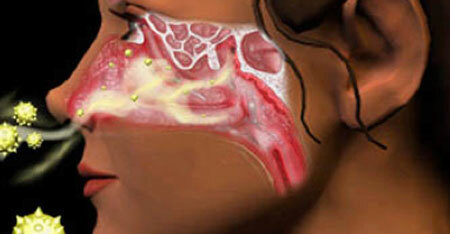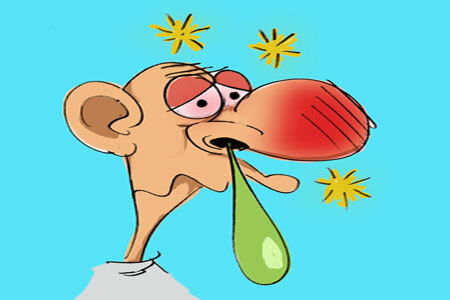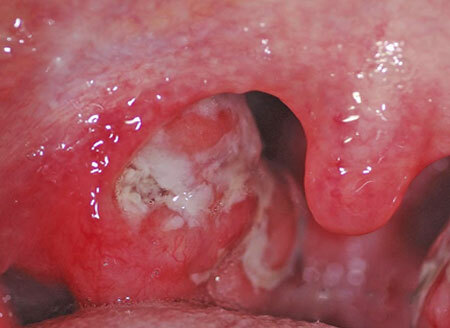Inflammation of the nasal mucosa due to a viral infection is indicated for rhinitis, however, if other factors are the reasons for the persistent nasal congestion and runny nose, the patient is diagnosed with vasomotor rhinitis.
Contents
- 1 Vasomotor Rhinitis - What is it?
- 1.1 Classification of the disease
- 2 Symptoms of vasomotor rhinitis
- 3 Diagnosis of vasomotor rhinitis
- 4 Treatment of vasomotor rhinitis in adults
- 4.1 Complications
Vasomotor rhinitis - What is it?
Vasomotor rhinitis is a violation of full nasal breathing, which develops as a result of changes in the tone of blood vessels located in the nasal mucosa. As a result of pathology, the mucous membranes produce a greater amount of protective mucus, because of this the patient suffers from a chronic runny nose.

Vasomotor rhinitis occurs most often for the following reasons:
- Breaking the hormonal background( for example, with prolonged intake of oral hormonal contraceptives, during childbearing, diseases of the pituitary and thyroid gland);
- Deformation of the nasal septum resulting from the resulting injury to the nose;
- Chronic stress;
- Predisposition of the body to allergic reactions;
- Uncontrolled use of vasoconstrictive nasal drops.
The risk factors that may cause chronic vasomotor rhinitis are:
- Staying constantly in a stuffy, poorly ventilated room( for example, when working in the office);
- Mold fungi indoors;
- Smoking( including passive smoking) or drinking alcoholic beverages;
- Dry indoor air;
- Neurocirculatory dysfunction;
- Frequent viral infections against which rhinitis develops;
- Intolerance to odors( eg, perfumes, tobacco, chlorine and others).
Classification of the disease
Depending on the clinical signs and causes of the disease, vasomotor rhinitis is divided into the following types:
- Allergic;
- Neurovegetative.
Vasomotor allergic rhinitis is caused by exposure to the human body of allergens, for example, domestic animals, mold, pollen, dust, inhalation of synthetic detergent vapors.
Neurovegetative vasomotor rhinitis most often affects people with increased nervous excitability. Under the influence of stress or fatigue in these patients, nasal breathing, nasal rhinorrhea and congestion can suddenly worsen, but rhinitis in this case is not associated with a viral infection.
Symptoms of vasomotor rhinitis

The main clinical symptoms of vasomotor rhinitis in adults are a runny nose, difficulty breathing, nasal voice, deterioration of smell.
As the pathology progresses, an insufficient amount of oxygen enters the lungs, as a result of accompanying clinical symptoms:
- Headaches;
- Rapid fatigue;
- Sleep disorder, insomnia;
- Impairment of appetite;
- Frequent viral infections against the background of a decrease in the body's defenses;
- Deteriorating perception of new information.
The main difference between and vasomotor rhinitis from a viral infection is a nasal congestion in only one of the nostrils, which occurs more often after a night's sleep, and after the change of body position this phenomenon disappears by itself without the use of nasal drops.
In some cases, the patient has whitish mucous discharge from the nose, as well as a sensation of lumps in the pharynx.
Diagnosis of vasomotor rhinitis
Neurovegetative rhinitis is similar in its symptoms to an allergic rhinitis, but the course of therapy is completely different. In order for the treatment of vasomotor rhinitis in adults to be adequate, first of all you should consult a doctor and undergo a checkup.
To identify the cause of a persistent runny nose and stuffiness, the patient is prescribed:
- Allergy test( allows not only to confirm or exclude an allergic reaction, but also to determine what the patient is allergic to);
- Blood tests for immunoglobulins and the number of eosinophils;
- X-ray examination of the sinuses of the nose( allows to determine if there are polyps or curvature of the septum in the nose).
Treatment of vasomotor rhinitis in adults

Drugs for treatment of vasomotor rhinitis should be selected only by a doctor, based on the results of previous diagnostic procedures.
Self-medication with vasoconstrictive drops is unacceptable, as it can lead to aggravation of the condition and dystrophic changes in the nasal mucosa.
Treatment of vasomotor rhinitis at home is to maintain the ratio of humidity and air temperature in the room, normalize the psychological situation in the family, exclude contact with allergens( in rhinitis of allergic origin).
To reduce the clinical signs of neurovegetative rhinitis, the following patient actions will help:
- Moderate physical activity, such as running, swimming, aqua aerobics, will help to improve the functioning of the autonomic nervous system, so it will have a favorable effect on the condition of the blood vessels of the new cavity;
- Treatment of chronic infections and diseases in the body;
- Refusal from bad habits, including from passive smoking;
- Hardening of the body and the use of a contrast shower - the alternation of jets of cold and hot water has a strengthening effect on the vessels.
Medicamentally neurovegetative rhinitis is treated with injections of hormones and blockade with hemostatics, which remove the swelling of tissues and improve the tone of blood vessels.
Good results are observed in the treatment of vasomotor rhinitis with a laser. After the procedure, blood microcirculation improves, mucus production decreases and the state of the vessels is normalized.
When a patient is diagnosed with pathological changes in the nasal cavity that interfere with the normal functioning of blood vessels, surgery is indicated.
Complications of
Dangerous complications of neurovegetative cold are:
- Shortness of breath;
- Hypoxia of body tissues as a result of insufficient intake of oxygen into the blood;
- Inflammatory lung disease;
- Asthma;
- Chronic bronchitis;
- Polyps in the nose;
- Degenerative changes in the tissues of the nasal cavity.
Vasomotor rhinitis significantly worsens the quality of life of the patient, therefore, if the nose is not passing through for a long time and is not associated with a viral infection, the patient is recommended to consult an otolaryngologist.



